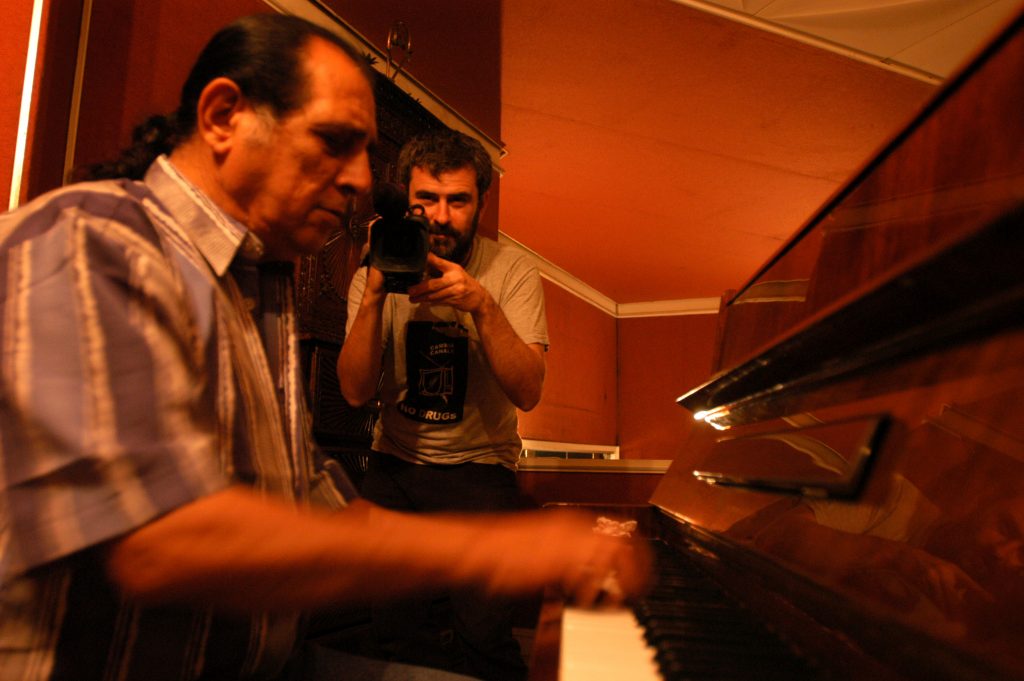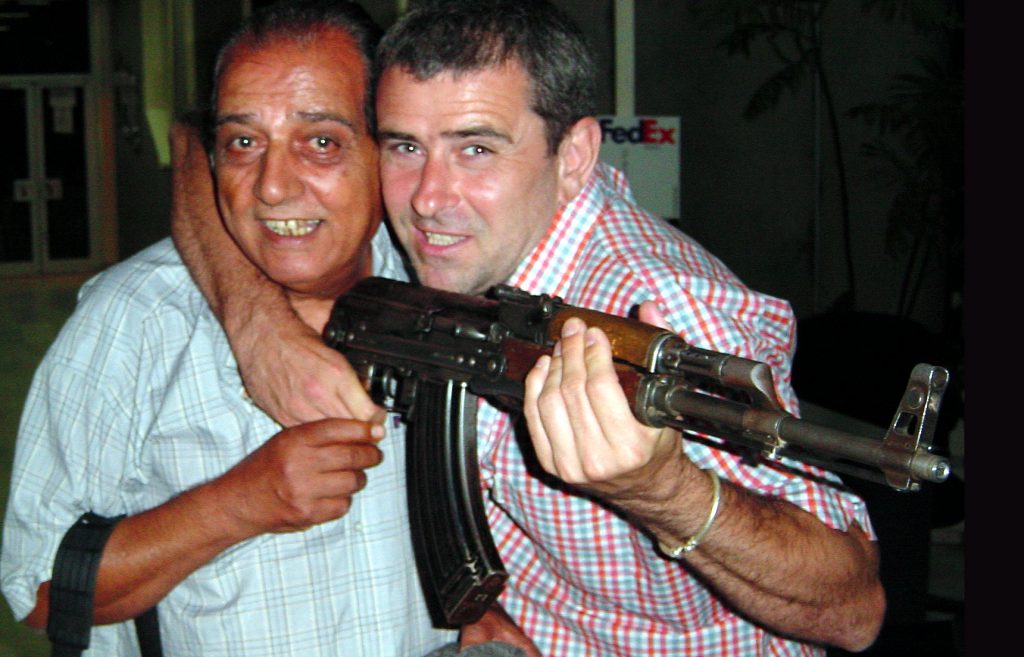I have been here in the Al Dulamie hotel for 3 days, I’d avoided haggling over the price, then the boss, Abu Noor showed his face round the corner of my door. “Mr Sean about your stay..” It was time to haggle. I’m usually good at haggling but Abu Noor is better, a real expert, or at least someone I always fail to outbid. He is a rotund gentle man. He was happy to see Saddam in the dock, Saddam killed his younger brother. He doesn’t agree with the death penalty but in Saddam’s case he said the people need to see justice. In an angry moment he tells me that Saddam should be put in a cage in the zoo, paraded for the people, and left to die there. Abu Noor runs a cheaper end, family run hotel next to a 4 star flash place over the road. Around us are about 5 hotels, (well 4 since one was bombed a few weeks ago by a suicide bomber who also killed the 13 year old cigarette seller in the street.) All the hotels here supposedly profit from what looks like good security, guns, concrete walls, checkpoints, etc.. none of this means anything of course until it is put to the test. Can anyone stop a suicide bomber I ask one of the many private security companies working here? No, they answer. Are we safe against a rocket propelled missile attack I ask? No they answer, if they want to send an RPG over here they can. They got the Palestine Hotel a few months back by firing a mortar off the back of a donkey and cart. The first mortar hit the hotel, the second would have certainly killed people except that the donkey shat itself and ran away, dragging the mortar’s with it. The joke for months after was that ‘the donkey saved our lives’.
As I wake this morning I hear on the news that the Sheraton Hotel was rocket attacked killing 3 people. When I arrived here on my first visit since the fall of Saddam in January, the Sheraton had just been hit. I was told that it was probably the safest place to stay now as it had already been hit. That advice came from one of the many expensive security companies working here for contractors, t.v. news organisations, and who also protect the US army convoys. I went against their advice and found a little family run hotel, the ‘Dulamie’, a famous fallujah family. I figured that as Fallujah was the hotbed of resistance in Iraq this hotel wasn’t gonna get hit. Abu Noor would always point to his father in the lobby, “Look he is the tribal leader, no one will touch us here.” Shame the Americans never understood the power of tribal leaders when they occupied this land over a year ago. They’d have been having an easier time by now if they had. In places like Fallujah it is difficult to imagine that the people were welcoming the American’s when they arrived. But heavy handed American tactics soon led to resentment, a pattern seen throughout Iraq, stories of American soldiers putting their feet on tribal leader’s heads is unimaginable here. It is a crime that incites the whole tribe to take revenge, which they do. And so things escalate.
Anyway, Abu Noor wanted his money. He is a shrewd businessman and I was tired and couldn’t argue for long. Finally I agreed to pay $1000 for a month, I know others are staying here for $700 and $800. Poolside, I opened a bottle of wine and drank with Marla, an American woman, who is here to help Iraqi families that have been bereaved by the US. She helps kids that have been orphaned find compensation. The heavy handed American response to an attack is to let rip in the general direction regardless of who they kill. As a result Marla has her hands full with children without parents and parents without children. She helps them make applications to the US to claim the $1200 paid to any family who has someone killed by accident by the Americans, a very difficult one to prove though. Marla has been looking into a friend’s case. A journalist had uncovered a story from Abu Griab prison where a US soldier, currently on trial for torturing Iraqi prisoners, is accused of killing one of his victims. Marla has a high powered US lawyer helping her see that justice is done to the soldier and that compensation is paid.
Poolside, we were all tired, talking war, an American friend Quil joined us, listening to our conversation he looked up from his beer. “can’t we talk about sex.. or something else, it’s always war and death.. and killing.” He should have been with me and the French journalists last night I thought. I didn’t feel like talking sex after such sad tales from Marla. But then I’ve only been back here 4 days and Quil has been here 6 long weeks. It’s amazing what 6 weeks in a war zone can do to your mind.
POSTSCRIPT
Sweltering heat in Baghdad today. I went against all advice for my safety and headed out to the most famous pizza restaurant in Baghdad. It has been ‘warned’ on a number of occasions for entertaining westerners and even the US army. The threat of a bomb attack doesn’t add to the wonderful taste of the food and wine. but for the 90 minutes we are there it is wonderful; like stepping out of all this madness.
I’d gone with George, a French journalist, who is interested in the other film I have been setting up whilst out here, ‘a behind the scenes documentary of the trial of Saddam’. We met more French journalists there, the ones from the other evening, but this time there was no talk of sex. Just the story.
One of them was working for an American network and wants to meet with me tomorrow night to talk about buying into our behind the scenes film of the trial. Good news I guess, but I was just enjoying the wine and air conditioning. Simple fun for a simple man. It seems the American networks have annoyed the Iraqi authorities by recording the sound of Saddam’s voice yesterday at the trial. And boy what an effect it has had on the streets, not only are our guards putting the thumbs up to Saddam, but my driver now also. On the way he declared to me, “Sean.. I love Saddam.”
I came back to the hotel to add all this into the blog and met the receptionist at the desk. He looked up at me with loving eyes and said, ‘Sean I love Saddam” I was becoming confused. I thought that the two glasses of good Lebanese wine had twisted my mind. I went into the kitchen and asked the tea boys “Do you love Saddam?” No, they answered, pulling their fingers across their throats, “finished.”
What is difficult to grasp here as my French friend George pointed out, “Arab people think from their hearts. Saddam was Iraqi, an Arab..he was one of them.. now they see a new leader, Ayad Allawi, the best of a bad bunch, a former CIA guy working with the Americans who is still guarded by Americans. Saddam was one of them.. they respect that.. even though he did all those things.. now who have they to look to..?”
After months of incomprehension, studying the confusion Iraqi people have felt since the fall of Saddam, things are becoming clearer to me. Like Samir said yesterday ‘imagine your country invaded and your queen paraded and humiliated like saddam. how would you feel? Saddam was a bastard, a bad man, but he was also our President, we feared him a lot’. And I started to see that silently many Iraqi people also respected him for his singled handed stand against America.

